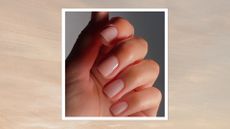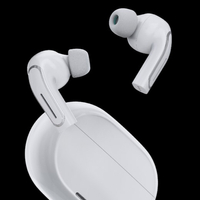5 early signs of hearing loss - and what to do about it
Look out for these early signs of hearing loss and get the treatment you need


The World Health Organization reports that 1.5 billion people live with some level of hearing loss, and 430 million of those will require treatment for it. While hearing loss can happen suddenly, more often than not it's a gradual decline that can easily go unnoticed. Here, we share five common early signs of hearing loss and what you can do about it.
From struggling to keep up with conversations to turning the TV up a little louder each time, the early signs of hearing loss can be tricky to spot if you don't know what to look out for. But, noticing hearing loss and getting help in the early stages is so important as it can slow down or prevent further loss.
Research by the National Center for Health Statistics found that around 15% of American adults aged 18 and over report having some trouble hearing. What's more, the NIDCD found age is the strongest predictor of hearing loss, particularly in the 60 to 69 age group.
Olive Pro: 2-in-1 Hearing Aids & Bluetooth Earbuds
Currently available to pre-order, the Olive Pro hearing aids and Bluetooth earbuds are said to create brilliant speech understanding, automated background noise cancellation and crisp sound quality for better music listening.
The most common signs of hearing loss
While hearing loss is common, especially as you age, it doesn't mean you have to suffer. Spotting loss early, finding the root cause, and getting the right treatment for you could make all the difference.
1. Difficulty hearing what others are saying
Constantly asking family and friends to repeat what they’ve said, and doing it more so than normal, could be a sign of early hearing loss. You may notice you’re paying more attention to a person’s mouth, using lip-reading to try to keep up with the conversation.
Dr. Martin Edwards says at the early stages, this may only be noticeable when you're in places with lots of background noise, such as a busy restaurant or cafe and the person is sitting further away from you. "This is when people often realize they can't follow along with a conversation and miss what is being said," he adds.
2. Turning up the TV volume
Another common sign of early hearing loss is listening to music or watching TV on a loud volume setting, says Dr. Edwards. "Sometimes it's the partner or someone the person is living with that notices the TV or radio is quite loud, but to that person, it's at a normal volume," he added.
Sign up for the woman&home newsletter
Sign up to our free daily email for the latest royal and entertainment news, interesting opinion, expert advice on styling and beauty trends, and no-nonsense guides to the health and wellness questions you want answered.
While having to adjust the volume on your TV shouldn't necessarily be a cause for concern, if you're straining to hear your program you might benefit from a hearing aid or hearing buds for watching TV.
3. Feeling exhausted after conversations
Feeling exhausted after conversations with family or friends is a common sign of hearing loss. If you’re struggling to hear as you normally would, and are having to concentrate really hard to keep up with the conversation, you’ll tire yourself out. This could become isolating, says Dr. Edwards, and cause a person to become cut-off from engaging in conversation leading to low mood.
If you're drawing back from chatting with your loved ones because you feel tired from intense concentration during conversations, it's important to seek further medical advice, because treatments are out there and they can really help.
4. Difficulty hearing on the phone
While it can sometimes be tricky to hear others over the phone with unpredictable phone lines and bad signal if you’re consistently finding it difficult to hear the person on the other end of the phone you could be gradually losing your hearing.
Dr. Edwards points out you might not even realize how much hearing you've lost until you go for a hearing test with an audiologist, where you'll do various exercises to determine your level of hearing loss.
5. Ringing in one or both ears
Research by the U.S. Centers for Disease Control and Prevention, found around 15% of the American population experience some form of tinnitus. The condition, which is also known as ringing in the ears, can result instead of or in addition to hearing loss and usually occurs following a change within the auditory system.
If you experience tinnitus, a sudden loss of hearing in one or both ears, or a sudden loss of hearing with increased tinnitus particularly on one side, Dr. Edwards advises you seek medical attention as soon as possible to determine the root cause.
What can I do about hearing loss?
Just like with vision loss, when it comes to hearing loss it happens at varying levels. Everyone will have a different experience and therefore need different treatment.
Treatments could be as simple as clearing a build-up of ear wax by using ear drops or investing in high-tech hearing aids to help you hear clearer while watching TV or listening to the radio.
A hearing device like the Olive Pro Airbuds by Olive Union could benefit your nightly viewing or help you keep up with conversations in noisy environments. Just like with glasses for reading or watching TV, you can wear the hearing aid buds as and when you need them. As they are a cross between a hearing aid and earphones, you can connect them to your smartphone and switch between hearing and music modes to suit your needs.
Other treatments for hearing loss include surgical procedures to remove excess wax or fluid and implants for severe hearing loss.
If you are concerned about your hearing, notice a dramatic change in your hearing ability, experience ringing in one or both ears or find your hearing loss is impacting your daily life, you may need more long-term treatment and should contact your doctor or physician for further medical advice.
Ciara McGinley is a meditation practitioner and health journalist. She qualified as a meditation teacher with the British School of Meditation in 2020 and is the founder of Finding Quiet, a series of classes, workshops and retreats that combine meditation practices and mindfulness techniques to make mindful living realistic in an always-switched-on modern world. She is all about bettering that mind-body connection but believes wellness looks different to everyone.
Ciara is also the former Health Channel Editor at woman&home and has covered all things health and wellbeing for years, from fitness to sleep to relationships.
-
 8 classic and elegant manicure designs that promise to elevate your nails - no matter their length
8 classic and elegant manicure designs that promise to elevate your nails - no matter their lengthFrom a sheer pink to a crisp French tip, these are the nail looks we always return to for elegant-looking hands...
By Naomi Jamieson Published
-
 Kate Moss makes a convincing case for winter florals - wearing the chicest vintage slip dress that's perfect for the festive season ahead
Kate Moss makes a convincing case for winter florals - wearing the chicest vintage slip dress that's perfect for the festive season aheadWe can't wait to shop similar styles before they sell out!
By Molly Smith Published

